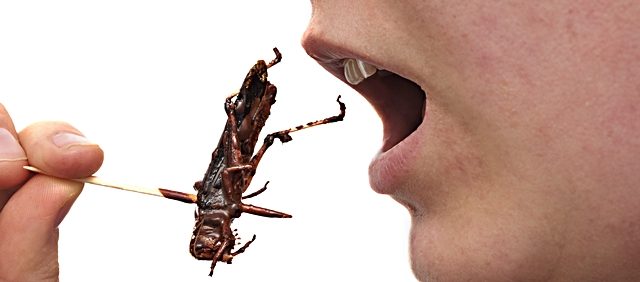Panel says forget the beef, eat more plants … bugs

EAT UP: DGAC’s foray into alternative food menus follows the United Nations’ global campaign to increase human consumption of insects — yes, bugs.
By Kenric Ward | Watchdog.org
WASHINGTON, D.C. — A federal dietary committee is veering into politics with a call for “sustainable” menus, including a virtual ban on meat consumption, a new report warns.
Hanns Kuttner says the Dietary Guidelines Advisory Committee is dishing out unsustainable advice while indulging in bureaucratic mission creep.
The panel recently heard recommendations that promote:
- A plant-based diet.
- Reduced meat consumption, identifying beef as the meat posing greatest concern.
- Fish consumption, provided it comes with advice about which fish should be consumed.
The working premise of DGAC is a “‘good diet would increase consumers’ costs and imply the end of entire sectors of American agriculture — all in an effort to regulate behavior that has nothing to do with nutrition,” said Kuttner, a senior research fellow at the Hudson Institute, a Washington, D.C.-based domestic and foreign policy think tank.
FORK IN THE ROAD: Hanns Kuttner warns that the Dietary Guidelines Advisory Committee is veering off course.
While DGAC touts its diverse culinary agenda, Kuttner says the panel itself lacks diversity of thought.
“In 2010 (when the last DGAC recommendations were made) the panel included a member who had practical knowledge of food production and food regulation,’” he said.
“No one on the 2015 panel can claim a similar perspective.”
The current committee lacks geographic balance, too. Four appointees — more than one-quarter of the board — are from Massachusetts – a state that represents 2.1 percent of the U.S. population.
Injecting a dose of fiscal and demographic reality, Kuttner notes:
“Americans who live hundreds of miles from organic grocery stores are not likely to meet or even take seriously many of the committee’s recommendations if they are far-off from the consumption patterns of the general public.
“Similarly, low-income families have a greater need to include convenient sources of protein and other essential nutrients, such as meat or dairy products, in their diet. A plant-based diet holds no sway for them.”
Promoting organic foods and vegetarian diets, DGAC echoes pronouncements from elites at the top of America’s political food chain.

DIET ADVICE: First lady Michelle Obama chided Olympic gold medal gymnast Gabby Giffords for eating an Egg McMuffin.
First lady Michelle Obama, for example, recently criticized Olympic gold medal gymnast Gabby Douglas for celebrating by snacking on a McDonald’s Egg McMuffin.
DGAC officials say their recommendations are merely advisory. Yet Kuttner sees “mission creep” that gives the group more influence with giant government agencies, notably Health and Human Services, the subsidy-granting Agriculture Department and the Pentagon.
DGAC’s foray into alternative food menus follows the United Nations’ global campaign to increase human consumption of insects — yes, bugs.
“They are nutritious, they have a lot of protein and are considered a delicacy in many countries,” Eva Muller, director of Food and Agricultural Organization’s Forest Economics, Policy and Products Division, declared last year.
Kuttner suggested better paths for DGAC to move America forward on the food front:
“Focus on what’s important. The most important nutrition issue for the general public continues to be the imbalance between calories consumed and calories expended. Each additional suggestion the DGAC makes reduces the average importance of other issues.
”Speak to people where they are. Proposals that do not respect income, heritage, culture and lifestyle are unlikely to be adopted. Change is costly and difficult. The burden lies on those who want change to demonstrate to the American people that change is worthwhile.
”Become open and transparent. The DGAC must make an effort to increase transparency by opening its subcommittee meetings to the public and broadcasting them online. (Full committee proceedings are viewable online.) The DGAC should also use the full breadth of available research. Any research the committee uses should be available to the public while it is being considered — not kept hidden until after the DGAC’s final report is issued to the Departments of Agriculture and Health and Human Services.
“More diverse composition. The committee should include experienced professionals with practical experience, not just academics. There should be a focus on regional and cultural diversity to ensure a broad range of experiences and nutritional concerns.”
Though DGAC’s report is not due until 2015, skeptics say problems plaguing the nation’s revamped school lunch program should be a warning.
Since 2010, when Washington began mandating “healthy” school menus, 1.6 million students have dropped out of the program.
Many of those still in are throwing away tons of government food each school day in what experts call “plate waste.”
An ironic outcome for a law titled the “Healthy and Hunger-Free Kids Act.”
Kenric Ward is a national reporter for Watchdog.org and chief of the Virginia Bureau. Contact him at kenric@watchdogvirginia.org or at (571) 319-9824. @Kenricward







